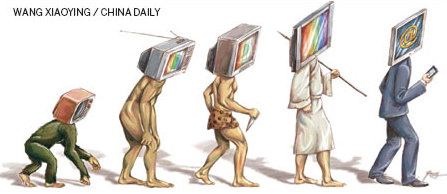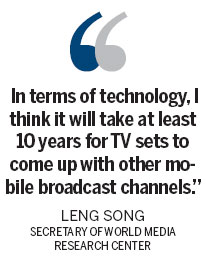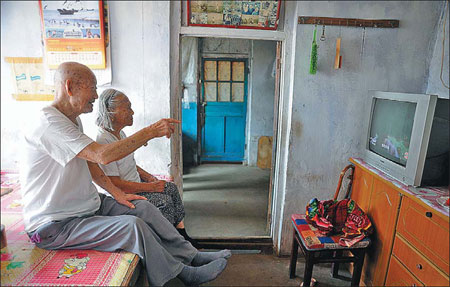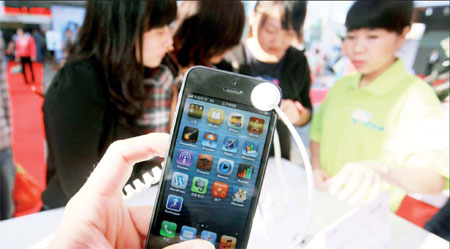Idiot box Needs to get smarter
Updated: 2013-05-03 08:30
By Yang Wanli and He Na (China Daily)
|
|||||||||||

|
Farmer Gong Deyun and his wife Sun Yucui watching TV at their home in Gongjia village, Rushan, Shandong province. Liu Guoxian / for China Daily |
|
Young people visit a mobile phone store in Haikou, capital of Hainan province, Provided to China Daily |

TV sets are fast losing their charm with the widespread use of laptops, iPads and smartphones
Song-and-dance duets are 78-year-old Ren Shuzhen's favorite, and like many other people in Northeast China, the resident of Jilin province spends almost the entire evening watching them.
The 55-inch smart TV set that her daughter gave her as a housewarming gift last year has advanced audio-visual functions. The 8,000-yuan ($1,296; 984 euros) TV has a lot more functions, though. "It can be connected to the Internet and I can even watch movies in 3D," says Ren. "But it's too complicated and I don't use any of those functions."
Of the three pairs of glasses for watching 3D programs, only one has been used, and that was by Ren's two-year-old great grandson who wore them outdoors as sunglasses. Besides, Ren's 52-year-old son is not interested in TV dramas and her granddaughter prefers watching videos on her iPad. That has left Ren alone with the TV.
Ren is one among millions of Chinese experiencing the change in TV viewership. A report by iResearch, issued earlier this year, shows that the number of families in Beijing watching programs on TV dropped from 70 percent in 2009 to 30 percent in 2012. In Shanghai, the figure was just 27 percent in March.
The popularity of computers, tablets and smartphones poses a great challenge to TV. Ministry of Industry and Information Technology figures show that smartphone ownership in China was 130 million in 2011, and iResearch estimates show it will increase to 240 million in the next two years.
"Watching TV is a really old-fashioned activity for my generation. There are very few programs I am interested in," says 16-year-old Yang Yin, who usually watches American TV dramas and videos on her iPad or computer. Her classmates also seldom watch TV, she says. Most of her friends are fans of American, British or South Korean dramas. "We don't like dubbed foreign dramas shown on TV channels because they lose their original flavor. Besides, the long and boring TV advertisements are unbearable."

Computers give Yang a private entertainment experience. She can enjoy watching her favorite program, movie or video show on the Internet anytime, anywhere. "Even if the TV is connected to the Internet, it would mean nothing to me," she says.
According to her, she hardly has any privacy while watching TV because TV sets are usually kept in the living room. "On the computer, I can watch a program without having my parents seated beside me. It's about freedom," she says.
Yan Zhiyong, 34 and father of a six-year-old boy, says the family rarely watches TV, because he and his wife want their son to develop the habit of reading and playing outdoors instead of becoming a couch potato. "An iPad or smartphone can meet the need of watching videos for me," he says.
The TV set Yan has at home was bought five years ago, and the couple watched TV programs or movies on it. Yan says he will not buy a smart TV, at least not in the next five years. "A laptop with perfect functions costs 5,000 yuan on average. But a smart TV comes for 8,000 yuan or more," he says. "And a laptop even provides more functions. So what do I need a smart TV for?"
"I think the biggest problem lies in the outdated fixed model," says Song Ziwen, a well-known TV program and film critic, and director of Beijing Caose Qingqing Culture Communication Co. "If you pay attention you will see that almost similar programs are telecast on different channels at the same time. All the popular variety shows are telecast on Friday or Saturday nights. And after the 7 pm CCTV evening news, all the channels telecast TV series and even the advertisement breaks occur at the same time.
"This uniformity has driven away many viewers, especially the young ones who like pursuing freedom. Youngsters like to grasp the initiative and do not want to be led by the nose. Compared with fixed TV programs, video apps and the Internet give people more options. Without any time limit, I can watch any program I like whenever I want."
Young people are abandoning the habit of watching TV at home, for most of the series are telecast between 8 pm and 10 pm when it's time for them to meet friends or have supper.
"I know that some TV stations want to make their programs more innovative, but that will take time," Song says.
"Given the current audience-rating competition mechanism, few of them have the courage to take the risk. Instead, they would rather buy or even copy some shows or TV series from abroad or other domestic channels.
"Without innovation and finding other profit models, it will be really difficult for TV channels to win back viewers. In the United States, premium channels have developed a good profit model under which people can order their favorite TV programs after paying a certain amount of money."
Social circumstances have forced people to choose other channels to access programs broadcast in the past, says Leng Song, secretary of World Media Research Center, affiliated to the Chinese Academy of Social Sciences. "An increasing number of people are trying to access certain episodes of some programs they missed but which have sparked a debate that they want to be part of. What they want sometimes is just a small fragment of a program."
Smart-TV manufacturers have been trying to come up with new technology and design to provide better audio-visual effects for viewers, but the feedback has not been that promising.
According to a China Electronics Chamber of Commerce survey, the penetration rate of smart TV sets in the Chinese market was nearly 40 percent at the end of last year. The figure is estimated to reach 50 percent this year, that is to say, smart TV will account for about 60 percent of the about 450 million TV sets in the country.
Another survey conducted by the chamber shows the average age of people who watch TV regularly is 40 years and above, with experts saying the age will be higher in the following years. This is likely to contract the TV set market further.
Most Chinese homes with smart TVs need at least three remote controls - one for the TV set, another for the set-top box and a third for auxiliary gadgets like DVD players.
And the remote control of a smart TV set alone has between 70 and 80 buttons. "It is very confusing and complicated for people of my age," says Ren, the song-and-dance duet fan. "I can recognize only a few buttons like the 'on' and 'off' ones and those meant to change channels and the volume."
Computers and mobile phones are preferred by the younger generation for their "convenience", Leng says. "In terms of technology, I think it will take at least 10 years for TV sets to come up with other mobile broadcast channels.
"Take the iPad for example. It has only one button and my 90-year-old father as well as 4-year-old son both can handle it easily. But a smart TV, with two or three remote controls, is very complicated. Without carefully reading the instructions, it will take you a long time to find what you want."
"To attract more customers, TV manufacturers have to be innovative with their products," says Chen Bingfeng, marketing manager of TCL, China's leading television and mobile phone maker. Many smart TV owners have not been able to use all the high-tech functions, Chen says. And only if after-sales service is improved and ancillary devices are made user-friendly will people feel attracted to smart TVs. "The industry's chain is big and cannot be built by just the TV set manufacturer. It also needs the help of software designers, auxiliary device makers and, above all, customers," Chen says.
A smart TV has to be simple to operate to attract buyers, according to a market survey conducted by Hisense, a leading Chinese TV manufacturer. Trying to meet this requirement, Hisense has created a new model with only 28 buttons on its remote control, which hit the market on April 17. Also, it takes only 0.1 of a second to switch on the TV with the remote control.
It seems, TV viewers have to be content with such changes until a really smart TV set that can be controlled by voice or the eyes hits the market, says Zhou Houjian, chairman of Hisense.
Contact the writer at yangwanli@chinadaily.com.cn and hena@chinadaily.com.cn.
(China Daily 05/03/2013 page24)
Today's Top News
China's automaker to open 1st US plant
Two preschool girls die from poisoning
Academic elected into US science academy
Beijing acts on complaints against airport cabbies
Military denies expensive vehicle had new plate
Police in major crackdown on tainted meat
Joint fund on hunt for investment opportunity
A-share firms' overall profits flat-lining
Hot Topics
Lunar probe , China growth forecasts, Emission rules get tougher, China seen through 'colored lens', International board,
Editor's Picks

|

|

|

|

|

|







